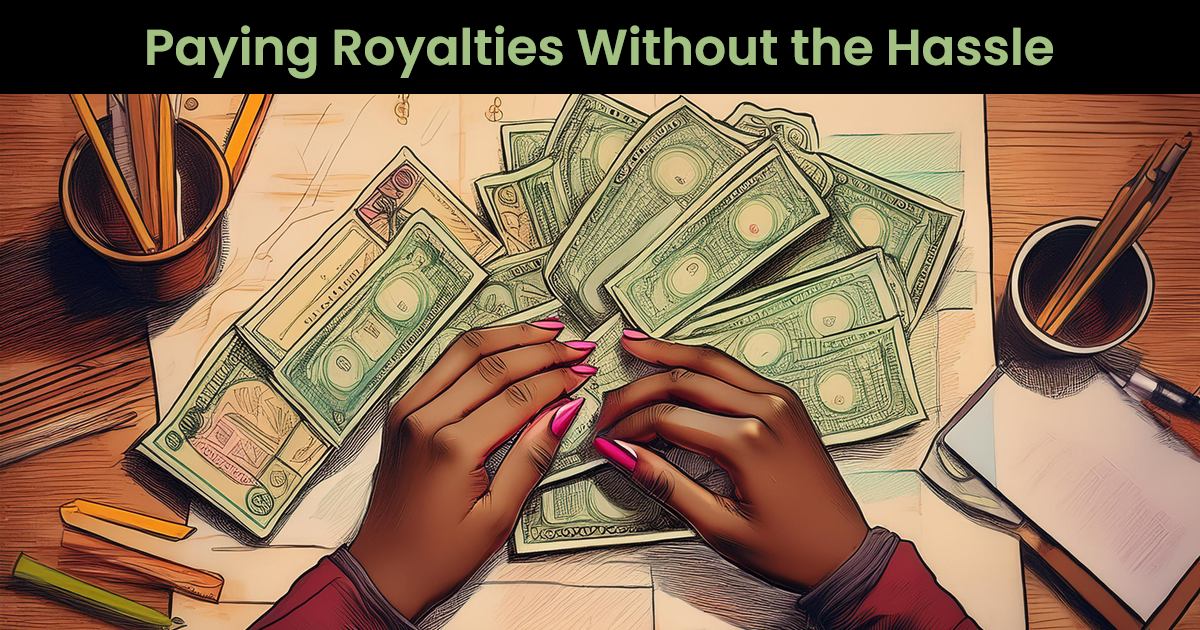No Results Found
The page you requested could not be found. Try refining your search, or use the navigation above to locate the post.
The page you requested could not be found. Try refining your search, or use the navigation above to locate the post.
Royalty payments are a key instrument in book publishing, biotechnology, and other industries that rely on the licensing and transfer of intellectual property. If your business is paying royalties to more than a handful of recipients in each royalty period, you may benefit from a software system that automates that process for you. For companies overwhelmed by manual processes, Royalty Tracker® eliminates the hassle of paying royalties through an automated solution.
This article will address these frequently asked questions about paying royalties:

Paying royalties refers to the process of compensating creators or owners of intellectual property (IP) for the use of their work. This compensation is typically a percentage of revenue generated from the sale or use of the work, such as books, music, patents, or natural resources. The terms and conditions under which royalties are paid are usually outlined in a contractual agreement between the parties involved.
Royalties are paid to:
Royalty payments are typically received by:
The recipients of royalties, often referred to as licensors, may change over time; for example, an author’s estate may receive payments after their death.
Royalty payments can vary widely based on the industry and specific agreements. Common structures include:
Royalty payments are typically made on a regular schedule agreed upon in the contract. Common intervals include:
The specific timing can vary based on the nature of the work and industry practices.
The duration for which royalties are paid is generally tied to copyright laws. In the U.S., for example, copyright lasts for the life of the author plus 70 years. This means that if a work continues to sell, royalty payments could extend for many decades, potentially benefiting the licensor’s heirs.
Paying royalties involves several steps:
For more information on this process, please see our article and video about The Royalty Management Lifecycle™.
Managing royalty payments can be a complex process fraught with various challenges. Here are some of the most common issues faced by organizations across different industries:

Yes, royalty payments can be automated using specialized software solutions. These tools streamline various aspects of royalty management by:
Automation can reduce processing time by up to 90%, minimize errors, and improve overall efficiency in managing royalty obligations.
Automating royalty payments offers numerous benefits that enhance efficiency, accuracy, and ease of mind. Here are some key advantages:
By leveraging automation in royalty payments, organizations can streamline their operations, reduce errors, improve relationships with stakeholders, and ultimately enhance their financial performance. Our customers have told us that MetaComet® software typically reduces the time they spend on royalty management by 90%.
Read more about how our royalty solutions can save you time, money, needless risks, and stress, or contact us today for a free, personalized consultation.
Check out our Resources section for more information about how royalties are paid and all the latest royalty information updates.

David Marlin is the President and Co-Founder of MetaComet® Systems, a prominent provider of royalty automation tools. Since founding the company in 2000, David has spearheaded the development of a suite of best-in-class systems that effectively facilitate royalty processes for nearly 200 publishers. David has also served as the chair for The Book Industry Study Group’s Rights Committee and Digital Sales Committee.
Before establishing MetaComet Systems, David served as a technology consultant for renowned publishers, collaborating with notable companies such as Random House, Penguin, HarperCollins, Holtzbrinck, Macmillan, Scholastic, Time Warner, and many others. David holds both an MBA and a BA from Columbia University in New York.
"*" indicates required fields